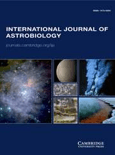
International Journal of Astrobiology
Scope & Guideline
Advancing Knowledge in the Search for Extraterrestrial Life
Introduction
Aims and Scopes
- Astrobiology Research:
The journal extensively covers research on the origins, evolution, and distribution of life in the universe, including studies on extremophiles, microbial life in extreme environments, and potential biosignatures. - Planetary Habitability:
A significant focus is placed on understanding the conditions necessary for life on other planets, including analysis of exoplanets, Martian environments, and icy moons, often involving geological and atmospheric assessments. - Prebiotic Chemistry:
Research into the chemical processes that may lead to the emergence of life is a core theme, with studies exploring prebiotic pathways, molecular evolution, and the role of various environmental factors. - Ethical and Philosophical Considerations:
The journal addresses the ethical implications of astrobiological research, including discussions on the moral status of extraterrestrial life and the responsibilities of humanity as a multiplanetary species. - Interdisciplinary Approaches:
The journal promotes transdisciplinary methodologies, integrating insights from various fields such as ecology, geology, physics, and sociology to enhance understanding of astrobiological phenomena.
Trending and Emerging
- Microbial Life in Extreme Environments:
There is a growing interest in studying microbial communities that can survive in extreme conditions, such as those found in Martian analogs and spacecraft clean rooms, reflecting an emphasis on understanding life's resilience. - Astrobiological Ethics and Philosophy:
Increasingly, papers are addressing the ethical implications of astrobiological research, including the moral status of potential extraterrestrial life and the responsibilities of humanity towards it. - Technological Innovations in Astrobiology:
The use of advanced technologies, such as μ-mapping X-ray fluorescence spectrometry and robotic exploration, is gaining prominence, highlighting the role of innovation in astrobiological research. - Interdisciplinary Collaborations:
There is a notable trend towards collaborative projects that integrate diverse fields, such as ecology, psychology, and astrobiology, indicating a recognition of the complexity of life in the universe. - Astrobiology and Climate Change Connections:
Emerging research is beginning to explore the links between astrobiology and current climate issues on Earth, suggesting that understanding life's potential elsewhere can inform our approaches to sustainability.
Declining or Waning
- Traditional SETI Approaches:
Research focused solely on traditional Search for Extraterrestrial Intelligence (SETI) methodologies has waned, as newer interdisciplinary approaches that incorporate astrobiological insights gain traction. - Historical Astrobiological Narratives:
Papers that primarily focus on historical narratives of astrobiology without current empirical relevance are becoming less frequent, indicating a shift towards more contemporary and applicable research. - Speculative Theories of Extraterrestrial Life:
Theoretical discussions without substantial empirical backing related to the nature of extraterrestrial civilizations or their technologies have decreased, suggesting a movement towards more evidence-based studies.
Similar Journals

Boletin de Ciencias de la Tierra
Fostering Global Dialogue on Geological DiscoveriesBoletin de Ciencias de la Tierra is a distinguished open-access journal dedicated to the field of Earth and Planetary Sciences, published by the Universidad Nacional de Colombia, Sede Medellín. Since its transition to open access in 2006, it has become an essential platform for disseminating high-quality research that addresses critical geological and environmental issues pertinent to Latin America and beyond. With an ISSN of 0120-3630 and an E-ISSN of 2357-3740, the journal aims to promote scientific dialogue and share innovative findings in various areas including geology, geochemistry, and environmental sciences. Although it currently holds a Scopus rank of #184 in the General Earth and Planetary Sciences category, indicating a percentile of only 5, Boletin de Ciencias de la Tierra is committed to fostering a rich academic discourse and enhancing the visibility of scholarly works. Situated in Medellín, Colombia, the journal serves as a vital resource for researchers, professionals, and students looking to explore advancements and participate in the global conversation on Earth sciences.

BULLETIN OF GEOSCIENCES
Exploring the Dynamics of Our Planet, One Study at a TimeBULLETIN OF GEOSCIENCES, published by the prestigious Czech Geological Survey, stands as a pivotal resource in the fields of Earth and Planetary Sciences and Environmental Science. Since its inception in 2003, the journal has been committed to advancing knowledge through high-quality research, currently holding a commendable Q2 ranking in both disciplines. With its focus on diverse and innovative topics, BULLETIN OF GEOSCIENCES provides an essential platform for researchers, professionals, and students aiming to disseminate and access impactful studies. The journal is indexed in Scopus, ranking #78/195 in General Earth and Planetary Sciences and #110/233 in General Environmental Science, reflecting its significant contribution to academia. Publishing from Prague, Czech Republic, this journal invites contributions that illuminate the interactions between geological processes and environmental phenomena, ensuring an inclusive and accessible approach to crucial global issues.
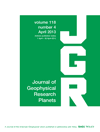
JOURNAL OF GEOPHYSICAL RESEARCH-PLANETS
Connecting Scholars to the Universe's WondersThe JOURNAL OF GEOPHYSICAL RESEARCH-PLANETS, published by the American Geophysical Union, stands at the forefront of planetary science research, serving as an essential resource for scholars and practitioners exploring the complexities of planetary bodies within our solar system and beyond. With its ISSN 2169-9097 and E-ISSN 2169-9100, this respected journal has demonstrated a notable impact within the academic community, holding a prestigious Q1 ranking in multiple categories including Earth and Planetary Sciences, Geochemistry and Petrology, Geophysics, and Space and Planetary Science as of 2023. Its Scopus rankings further highlight its significance, placing it among the top echelons of Earth and planetary sciences—particularly as it ranks 12th in its broad category. While not an open access platform, the journal provides invaluable insights into planetary processes, geological phenomena, and the ongoing exploration of celestial environments, making it indispensable for researchers, professionals, and students dedicated to advancing our understanding of planetary systems. Established in 1996 and continuing to publish until 2024, the journal remains committed to fostering innovation and collaboration in this dynamic field of study.

Geosciences
Advancing Knowledge in Earth and Planetary Sciences.Geosciences is a prestigious open-access journal published by MDPI, dedicated to advancing research in the field of Earth and Planetary Sciences. Since its inception in 2011, this journal has fostered a collaborative environment for the dissemination of innovative ideas and findings, contributing significantly to the academic community's understanding of complex geological processes. The journal has achieved a commendable 2023 ranking in the second quartile (Q2) within its category, highlighting its impact and relevance in the field, with a Scopus rank of #41 out of 195 journals, placing it in the 79th percentile. With an aim to span a broad range of topics from environmental geology to planetary exploration, Geosciences is pivotal for researchers, professionals, and students looking for an accessible platform to share their work and stay informed of the latest developments. As a fully open-access journal, it ensures that high-quality research is freely available, fostering greater dissemination of knowledge across the globe.

EARTH PLANETS AND SPACE
Pioneering Research in Earth and Space SciencesEARTH PLANETS AND SPACE, published by Springer and based in Switzerland, is a distinguished journal that plays a pivotal role in advancing the fields of Earth and planetary sciences. With an impactful presence in both geology (Q1) and space and planetary science (Q2), this journal is increasingly recognized for its contributions to understanding complex geoscientific processes and extraterrestrial phenomena. The journal has been a vital resource for researchers since its inception in 1996 and is anticipated to continue this legacy until at least 2024. It ranks impressively within the Scopus database, holding the 53rd position out of 321 in Earth and Planetary Sciences for Geology and the 30th position out of 104 for Space and Planetary Science, reflecting a robust percentile standing of 83 and 71, respectively. With open access options available, EARTH PLANETS AND SPACE makes cutting-edge research more accessible to a global audience, fostering collaboration and innovation. This journal is essential for anyone seeking to deepen their knowledge or stay current with trends in Earth sciences and planetary exploration.
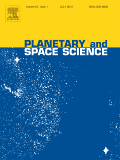
PLANETARY AND SPACE SCIENCE
Charting New Frontiers: The Intersection of Space and Planetary SciencePLANETARY AND SPACE SCIENCE is a leading journal dedicated to the interdisciplinary field of astral studies, encompassing both planetary science and the exploration of space. Published by PERGAMON-ELSEVIER SCIENCE LTD in the United Kingdom, this journal has been pivotal since its inception in 1959, continually contributing to advancements in research about planetary bodies, their atmospheres, and the broader cosmic landscape. With an impressive impact factor, PLANETARY AND SPACE SCIENCE ranks in the second quartile of Astronomy and Astrophysics and the third quartile in Space and Planetary Science as of 2023, showcasing its scholarly significance. The journal aims to provide a platform for the dissemination of cutting-edge research, emphasizing the critical role of space exploration and planetary studies in understanding our universe. Researchers, professionals, and students alike are encouraged to explore the wealth of knowledge presented in its pages, fostering a deeper comprehension of the phenomena that shapes both our solar system and beyond.
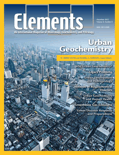
Elements
Shaping the Future of Geological KnowledgeElements is a premier academic journal published by the Mineralogical Society of America, dedicated to advancing knowledge in the fields of Earth and Planetary Sciences and Geochemistry and Petrology. Since its inception in 1973, this journal has established itself as a leading source of impactful research, evidenced by its prestigious Q1 rankings in both categories in 2023, placing it among the top journals globally with Scopus ranks of #18 and #23, respectively. Elements is uniquely positioned to foster interdisciplinary dialogue, offering a platform for groundbreaking studies that explore the fundamental processes shaping our planet. Although it operates without an open access model, its rigorous peer review process guarantees the integrity and quality of published work, making it an essential resource for researchers, professionals, and students eager to stay abreast of the latest developments in mineralogy and earth sciences. With a commitment to excellence, Elements continues to push the boundaries of our understanding of geological phenomena and their implications for both science and society.

EARTH MOON AND PLANETS
Advancing Knowledge in Planetary Science and AstronomyEARTH MOON AND PLANETS, published by Springer, serves as a vital platform for researchers and professionals in the interdisciplinary fields of astronomy, planetary science, and earth sciences. With an ISSN of 0167-9295 and E-ISSN of 1573-0794, this journal has been disseminating knowledge since 1984 and continues to provide valuable insights into the complexities of celestial bodies and their interactions. Although currently ranked in the Q4 quartile across its relevant categories, including Astronomy and Astrophysics, Earth and Planetary Sciences, and Space and Planetary Science, the journal remains committed to fostering academic discourse and innovation in its field. Located in the Netherlands, at VAN GODEWIJCKSTRAAT 30, 3311 GZ DORDRECHT, the journal offers an array of research articles designed to inspire scholarly exploration and collaboration. Despite not providing open access options, it nevertheless plays a significant role in shaping the discourse around planetary research and is essential reading for anyone looking to deepen their understanding of earth, moon, and planetary sciences.
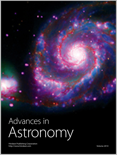
Advances in Astronomy
Bridging Knowledge Gaps in Astronomy and Planetary Sciences.Advances in Astronomy is a prestigious open-access journal published by HINDAWI LTD, dedicated to the field of astronomy and astrophysics. Established in 2008, the journal aims to disseminate significant research findings and advancements in the understanding of celestial phenomena, planetary sciences, and the intricate workings of the universe. With an impact factor that reflects its relevance in the scholarly community, Advances in Astronomy holds a commendable rank of Q3 in both Astronomy and Astrophysics as well as Space and Planetary Science categories, indicating its importance within these fields. The journal also showcases a commitment to open-access publishing, ensuring that research is readily available to both the scientific community and the public. Researchers, professionals, and students alike are encouraged to contribute to this dynamic forum to share knowledge and foster collaboration in exploring the wonders of the cosmos.
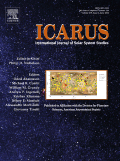
ICARUS
Connecting Scholars to the Stars and Beyond.ICARUS is a prominent peer-reviewed journal dedicated to advancing knowledge in the realm of Astronomy and Astrophysics, as well as Space and Planetary Science. Published by Academic Press Inc, Elsevier Science, this esteemed journal has been contributing to the scientific discourse since 1962 and will continue to do so well into 2024. With an impressive impact factor placing it in the Q2 quartile, ICARUS ranks among the top journals in its field, standing appropriately at #22 out of 90 in Astronomy and Astrophysics and #27 out of 104 in Space and Planetary Science according to Scopus metrics. Researchers, professionals, and students alike benefit from its comprehensive scope, which encompasses a wide array of topics related to planetary processes, space exploration, and astrophysical phenomena. Although it does not currently offer open access, the journal remains a critical resource for scholars seeking to disseminate their findings and engage with cutting-edge research in the exciting fields of astronomy and planetary science.